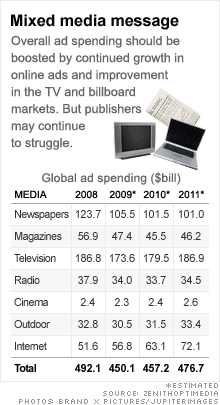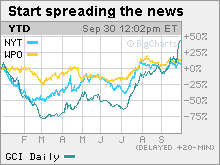Everybody's dissing big media, but ...
Shares of newspaper publishers, broadcasters and other 'old' media firms are on fire. Is it because advertising and the economy are really making a comeback?


 |
| Shares of newspaper companies Gannett, The New York Times and Washington Post were pummelled earlier this year but have all staged a remarkable comeback in the past three months. |
NEW YORK (CNNMoney.com) -- Nobody is reading newspapers, magazines and books anymore. Nobody is watching TV, listening to the radio or paying for music. Old media is dead! That's what "they" all say.
So if that's the case, why are shares of traditional media companies surging? With one day to go in the third quarter, the top stock in the S&P 500 since the beginning of July has been Gannett (GCI, Fortune 500), the publisher of USA Today and more than 80 local newspapers nationwide.
The stock is up a remarkable 229% for the third quarter. It gained nearly 18% on Tuesday after announcing that third-quarter profits would be ahead of analysts' expectations.
But Gannett is not the only media stock to enjoy a turnaround this quarter. Shares of ad agency Interpublic Group (IPG, Fortune 500) and The New York Times Co. (NYT) are both up more than 50%.
And shares of CBS (CBS, Fortune 500) have surged almost 80%, making it the 10th-best performer in the S&P 500. CBS, which in addition to the Eye Network, owns radio stations, billboards and book publisher Simon & Schuster, is about as "old media" as you can get.
So what does this mean? Are media stocks on fire because investors really believe that the overall economy is on the mend and that advertising sales -- the lifeblood of most media firms -- will soon pick up as well?
Or is the media stock rally just another example of investors bidding up a sector that was priced for oblivion -- much like banks, retailers and airlines -- earlier this year when people were fearing the economy was about to plunge into a depression?
It's a little of both.
"Media stocks were left for dead but some of the financial worries have been put aside. There are signs that advertising is stabilizing," said Edward Atorino, an analyst with The Benchmark Company.
Sure, it is tough to justify how much shares of Gannett and other media companies have bounced back in such a short period of time. But it's equally difficult to rationalize how low the stock was trading in March.
Gannett hit a 52-week low of about $1.85 a share back then, a price that valued the company at less than $450 million. Considering that Gannett is still profitable and is expected to generate $5.6 billion in revenue this year, investors clearly went overboard in their rush to sell the stock.
That was true for most other media firms as well.
"Three to six months ago, there were many question marks about what earnings would be like in 2009 and 2010," said Alan Gould, an analyst with Natixis Bleichroeder. "Media stocks were so depressed earlier in the year. They went to valuations I never saw in my career."
Still, the bull run in media stocks can only last if the economy continues to improve. And even if the recession is truly coming to an end, that doesn't necessarily mean that ad dollars are going to start quickly flowing again -- or that all media companies are going to benefit.
"The rate of decline in advertising revenue seems to be stabilizing, not improving. It's premature to say game's on," Atorino said. "Cable and TV are getting better. Some magazines are getting 'less worse.' And for newspapers, the bottom line is getting better because of cost cutting, not sales growth."
That's an important point to consider. Gannett, for example, boosted its earnings outlook for the third quarter, but not its sales guidance. Media companies have been slashing expenses through layoffs. That can only go so far.
In that respect, the media stock rally is really a microcosm of what's going on in the entire market and economy. Sooner or later, the big media firms will need to prove to Wall Street that their revenue is going to start growing again.
That can only happen if advertising picks up. And with the global economy still appearing to be in just the early stages of a recovery, an ad spending rebound is far from certain.
"A double-dip recession and advertising falling out of bed again are the biggest short-term concerns for media companies," Gould said.
The good news is that according to figures from ZenithOptimedia, an agency owned by French advertising services giant Publicis Groupe, there will be a recovery in ad spending next year. The bad news is that it will be mild at best.
ZenithOptimedia is predicting that overall advertising expenditures will be up about 1.5% worldwide in 2010. In addition to hopes of an improving global economy, events such as the Winter Olympics, World Cup soccer tournament and mid-term elections in the U.S. are also expected to boost spending.
But 2010 is following a brutal 2009. ZenithOptimedia expects total ad spending to be down 8.5% this year. And while TV and outdoor advertising is expected to bounce back and online ad spending is forecast to keep growing, ad spending on newspapers, magazines and radio is expected to fall again next year.
What's more, even though ZenithOptimedia expects ad spending to increase again in 2011, estimates for that year are still more than 3% lower than the total ad outlay worldwide in 2008.
Finally, keep in mind that even when the economy was humming along a few years ago, traditional media firms were facing tough challenges due to the rapid technological changes sweeping over the industry.
The increased popularity of digital video recorders, giving people the ability to zoom past commercials, has been wreaking havoc on TV broadcasters, for example.
In addition, the media world is simply more fragmented than it used to be. People don't have to be wedded to their local newspapers, TV and radio stations. The Internet obviously gives people more choice to watch, listen or read what they want when they want.
To be fair, many traditional media companies are adapting. I, of course, am more than a bit biased since I work for an online division of one of those media giants, Time Warner (TWX, Fortune 500).
But the growth in online ad spending is still not enough to offset declines elsewhere just yet. According to the ZenithOptimedia estimates, Internet advertising will make up only 15% of the total ad pie in 2011. And tech heavyweights like Google (GOOG, Fortune 500) and Microsoft (MSFT, Fortune 500), in addition to traditional media firms, are fiercely fighting for this slice.
All that adds up to continued concerns for most media giants, which has to make you wonder how much longer the rally can last -- even if the economic rebound is for real.
Talkback: Is "old media" dead or are all the predictions of the demise of newspapers, TV and radio greatly exaggerated? Share your comments below. ![]()

